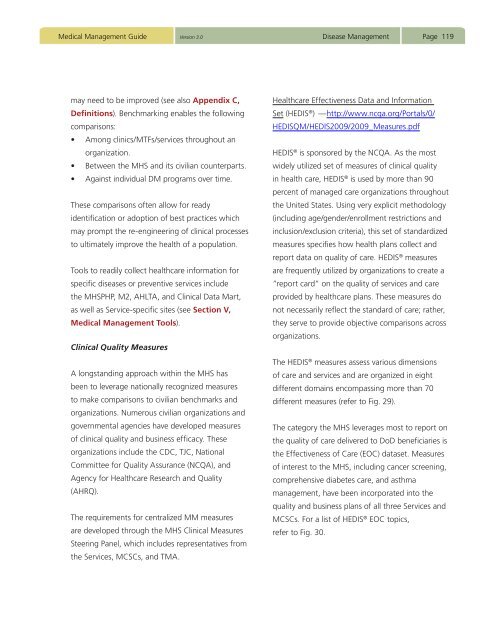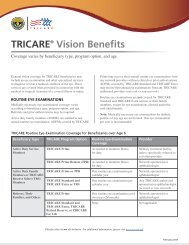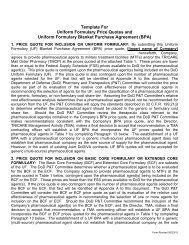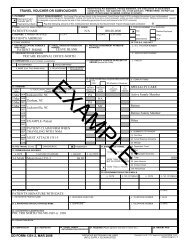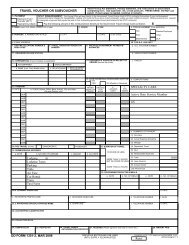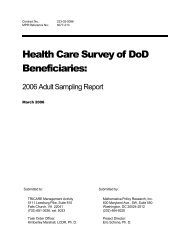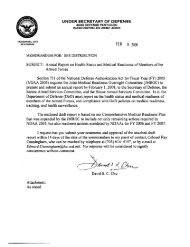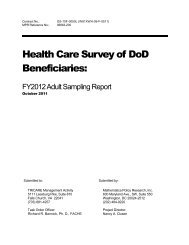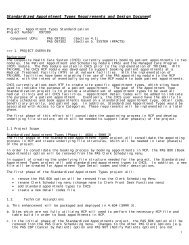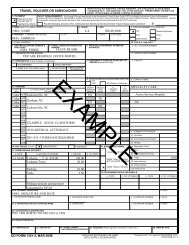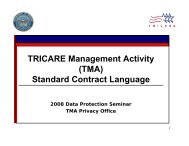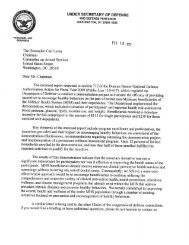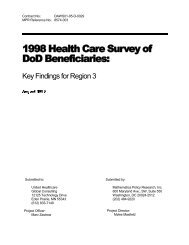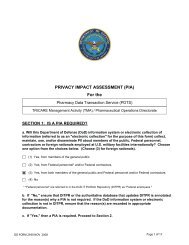Medical Management Guide, 2009, Version 3.0 - Tricare
Medical Management Guide, 2009, Version 3.0 - Tricare
Medical Management Guide, 2009, Version 3.0 - Tricare
- No tags were found...
Create successful ePaper yourself
Turn your PDF publications into a flip-book with our unique Google optimized e-Paper software.
<strong>Medical</strong> <strong>Management</strong> <strong>Guide</strong><strong>Version</strong> <strong>3.0</strong>Disease <strong>Management</strong>Page 119may need to be improved (see also Appendix C,Definitions). Benchmarking enables the followingcomparisons:• Among clinics/MTFs/services throughout anorganization.• Between the MHS and its civilian counterparts.• Against individual DM programs over time.These comparisons often allow for readyidentification or adoption of best practices whichmay prompt the re-engineering of clinical processesto ultimately improve the health of a population.Tools to readily collect healthcare information forspecific diseases or preventive services includethe MHSPHP, M2, AHLTA, and Clinical Data Mart,as well as Service-specific sites (see Section V,<strong>Medical</strong> <strong>Management</strong> Tools).Clinical Quality MeasuresA longstanding approach within the MHS hasbeen to leverage nationally recognized measuresto make comparisons to civilian benchmarks andorganizations. Numerous civilian organizations andgovernmental agencies have developed measuresof clinical quality and business efficacy. Theseorganizations include the CDC, TJC, NationalCommittee for Quality Assurance (NCQA), andAgency for Healthcare Research and Quality(AHRQ).The requirements for centralized MM measuresare developed through the MHS Clinical MeasuresSteering Panel, which includes representatives fromthe Services, MCSCs, and TMA.Healthcare Effectiveness Data and InformationSet (HEDIS ® ) —http://www.ncqa.org/Portals/0/HEDISQM/HEDIS<strong>2009</strong>/<strong>2009</strong>_Measures.pdfHEDIS ® is sponsored by the NCQA. As the mostwidely utilized set of measures of clinical qualityin health care, HEDIS ® is used by more than 90percent of managed care organizations throughoutthe United States. Using very explicit methodology(including age/gender/enrollment restrictions andinclusion/exclusion criteria), this set of standardizedmeasures specifies how health plans collect andreport data on quality of care. HEDIS ® measuresare frequently utilized by organizations to create a“report card” on the quality of services and careprovided by healthcare plans. These measures donot necessarily reflect the standard of care; rather,they serve to provide objective comparisons acrossorganizations.The HEDIS ® measures assess various dimensionsof care and services and are organized in eightdifferent domains encompassing more than 70different measures (refer to Fig. 29).The category the MHS leverages most to report onthe quality of care delivered to DoD beneficiaries isthe Effectiveness of Care (EOC) dataset. Measuresof interest to the MHS, including cancer screening,comprehensive diabetes care, and asthmamanagement, have been incorporated into thequality and business plans of all three Services andMCSCs. For a list of HEDIS ® EOC topics,refer to Fig. 30.


